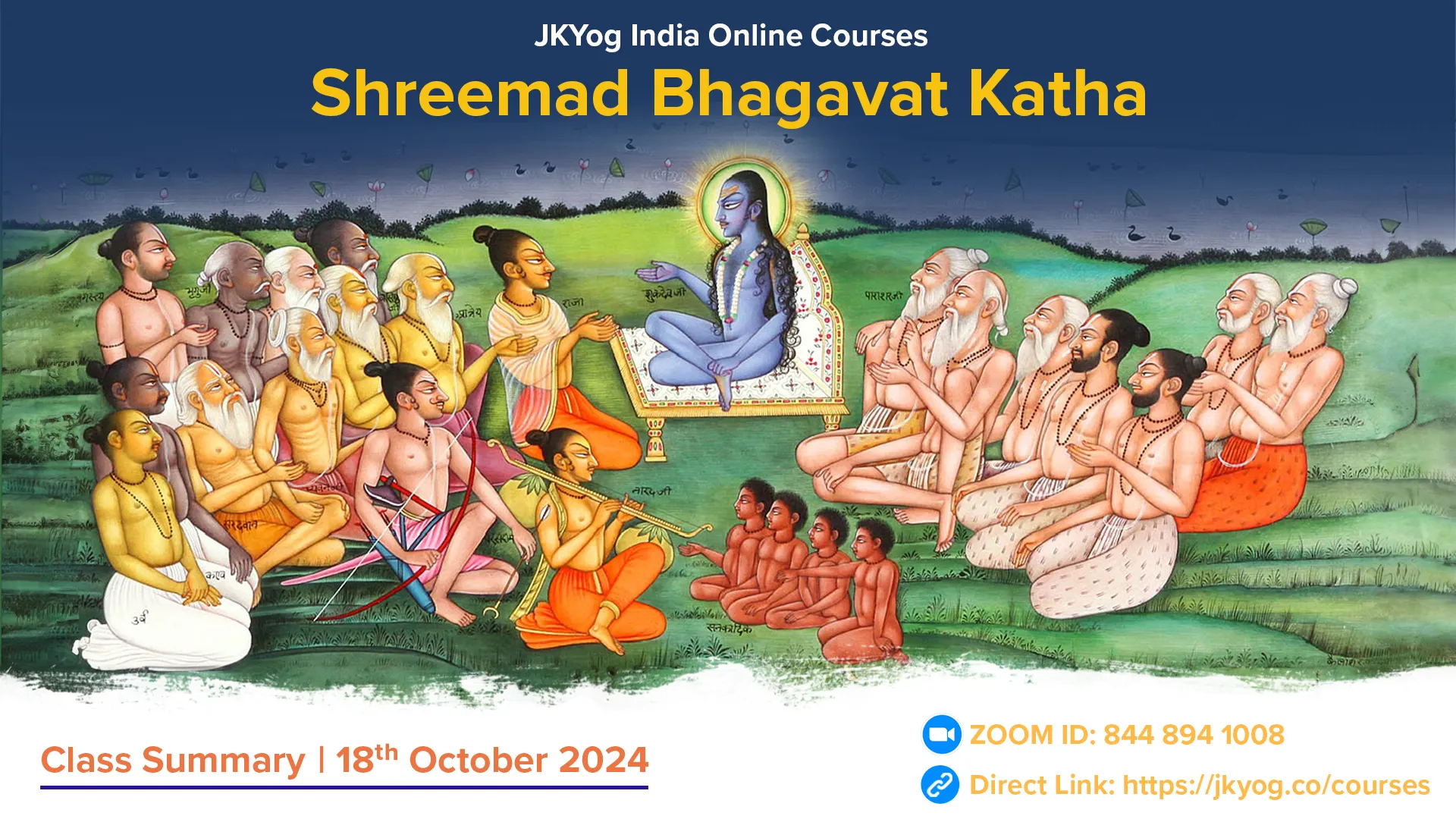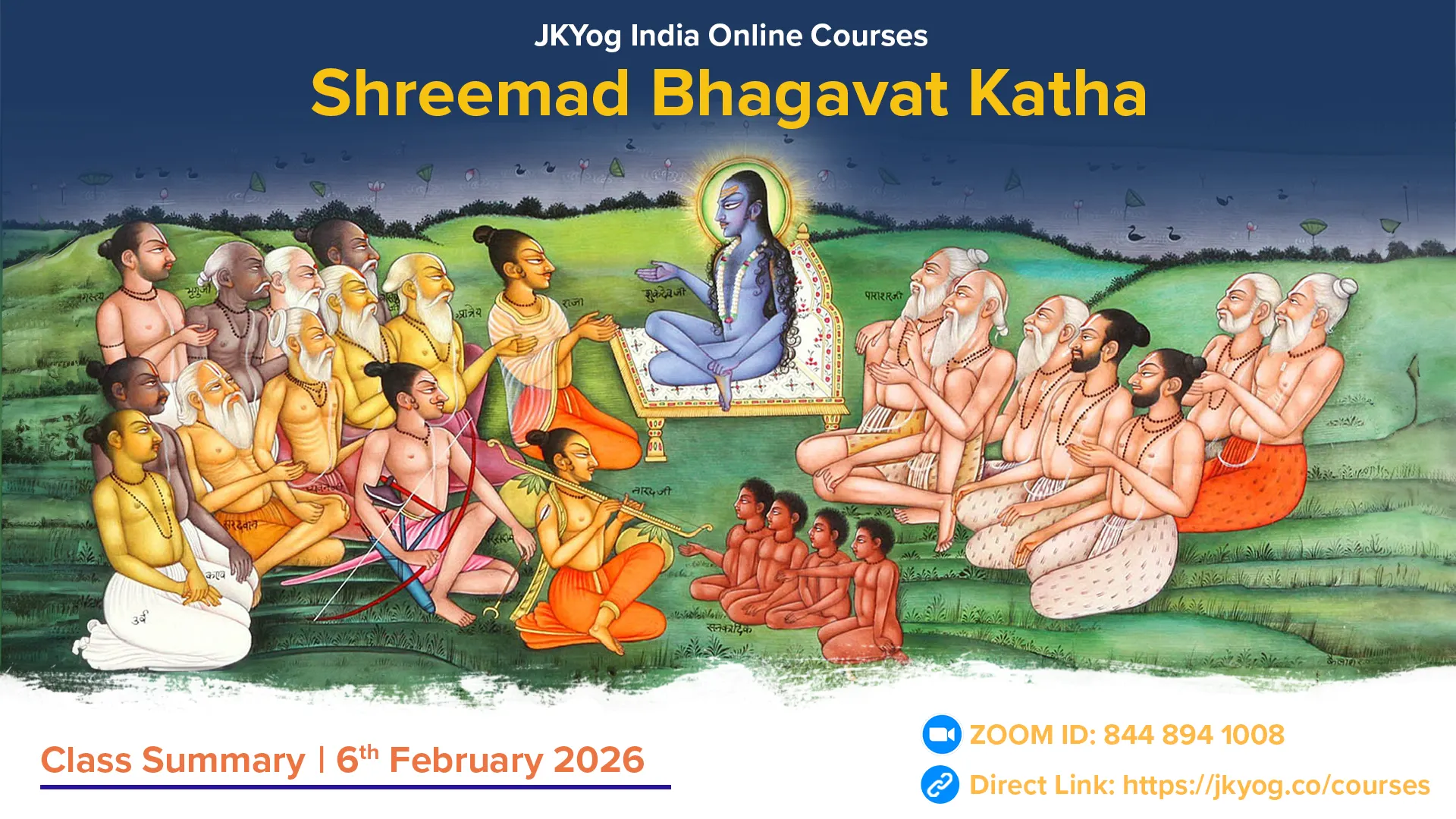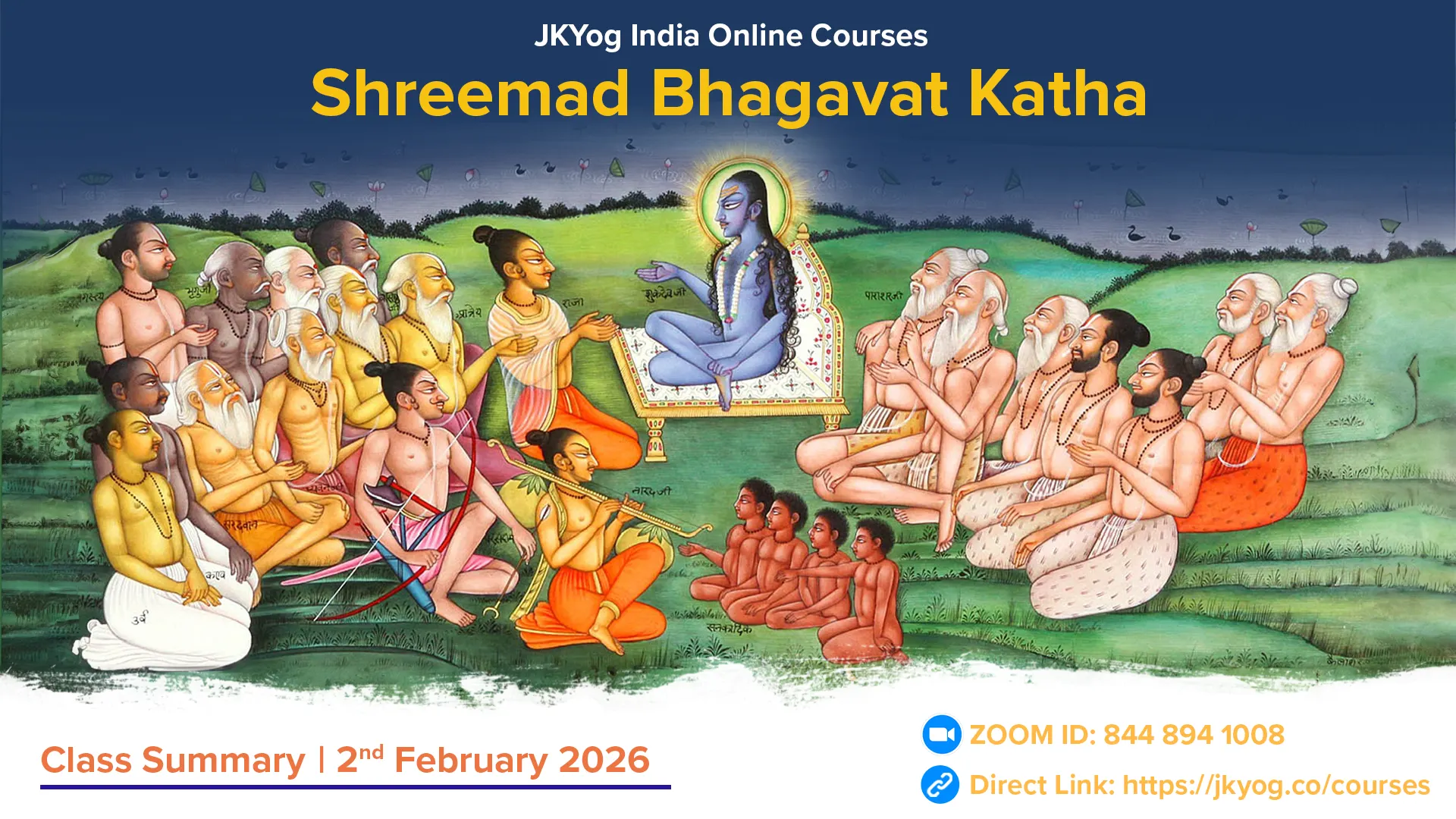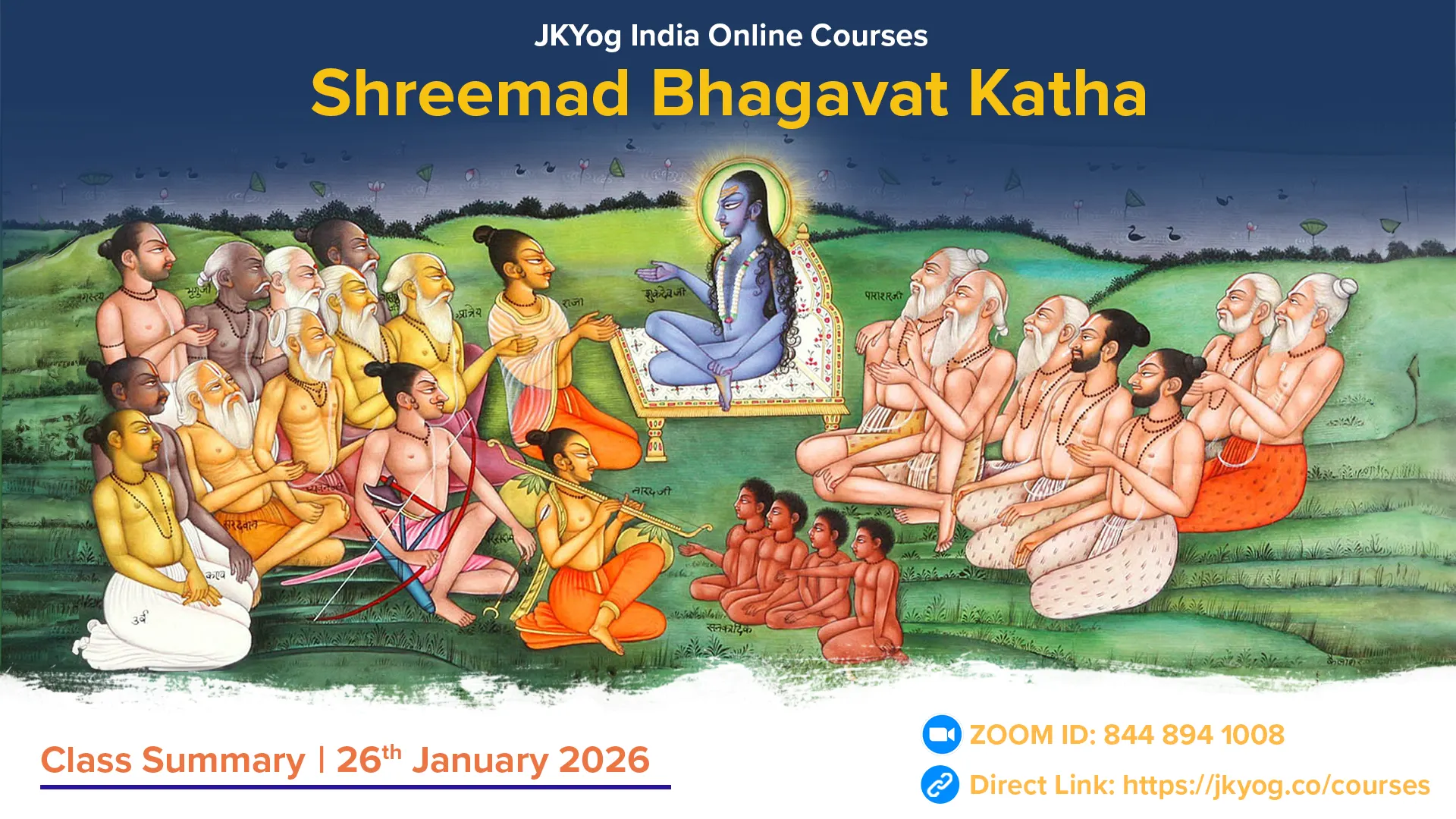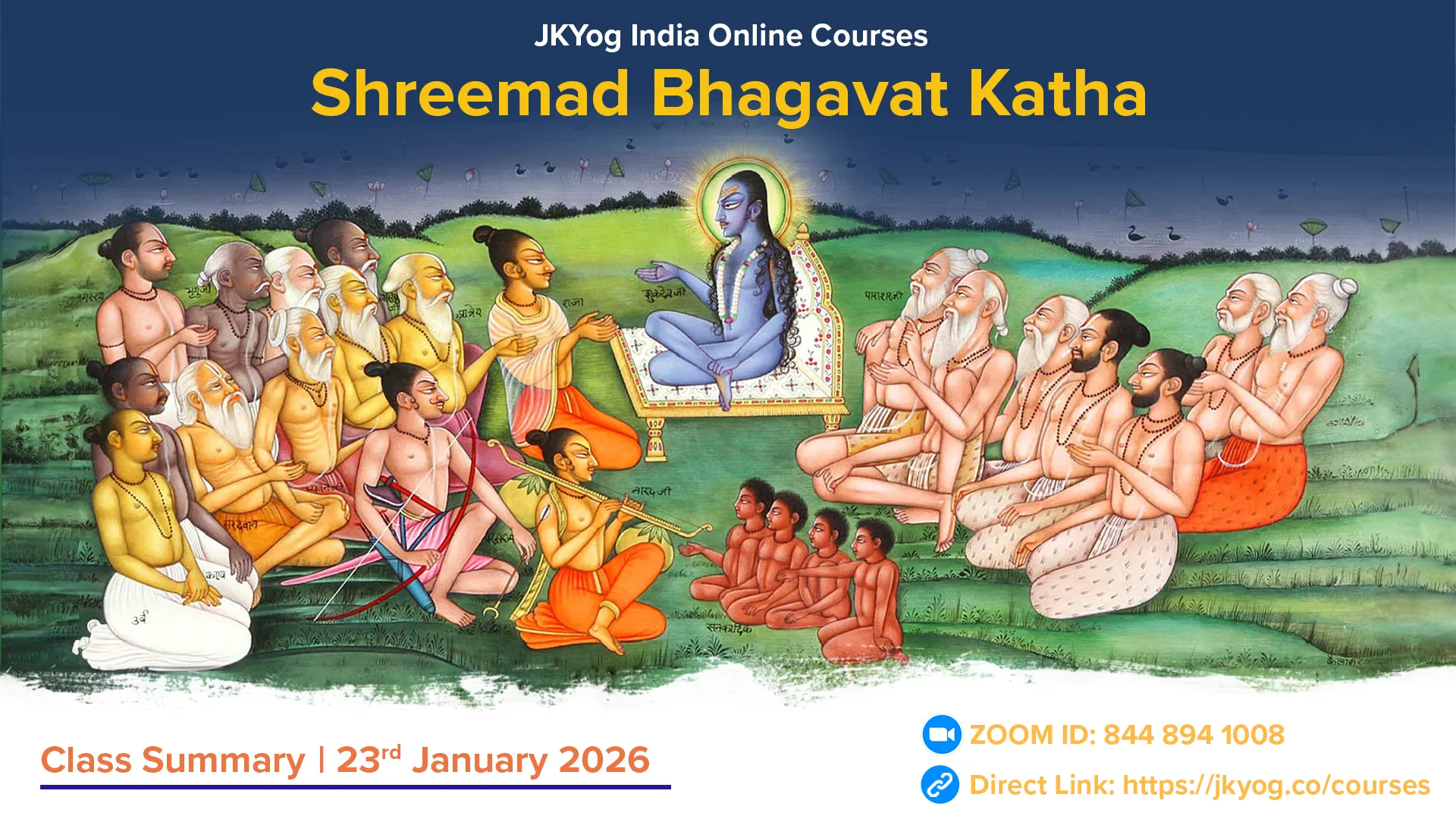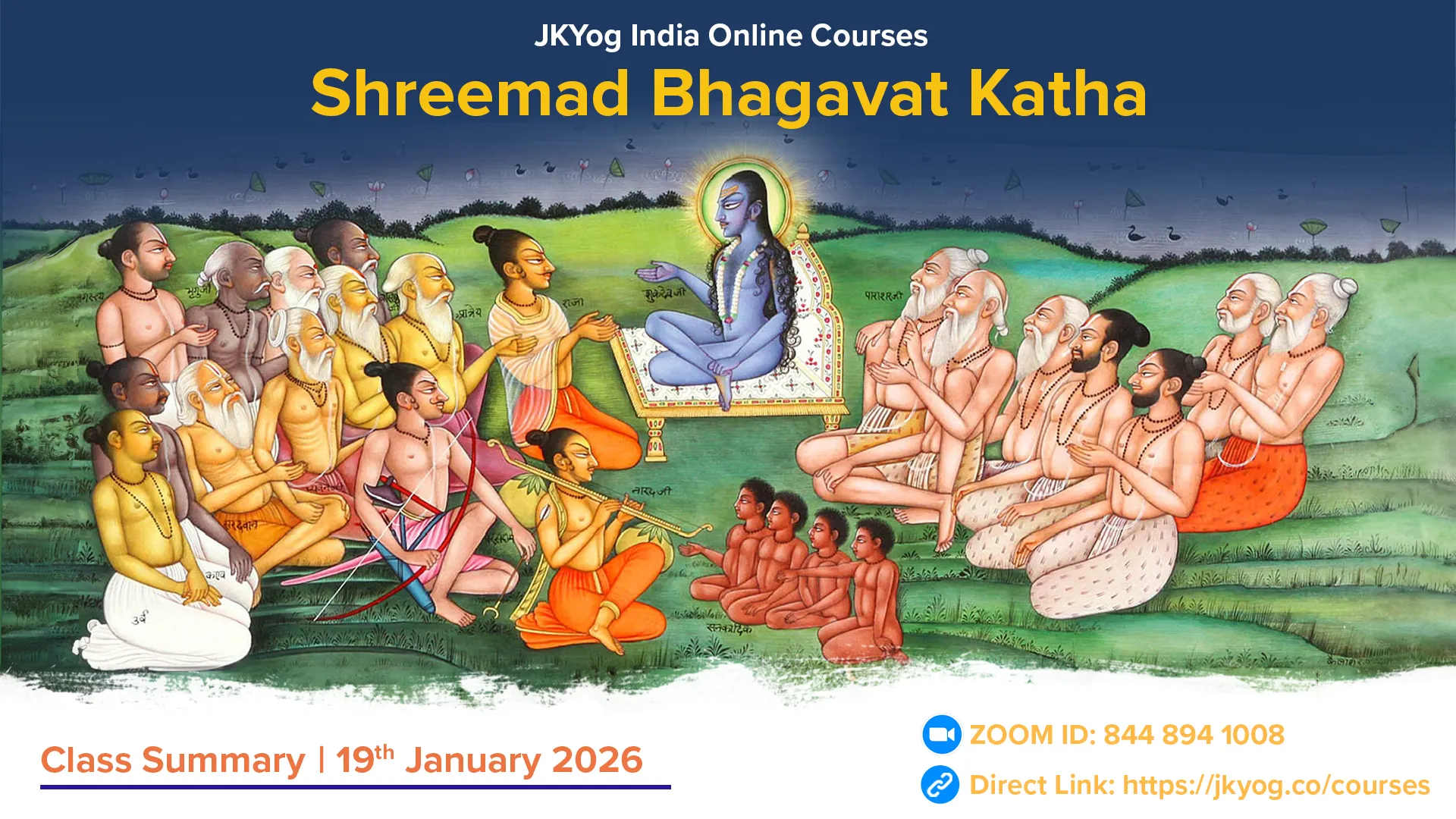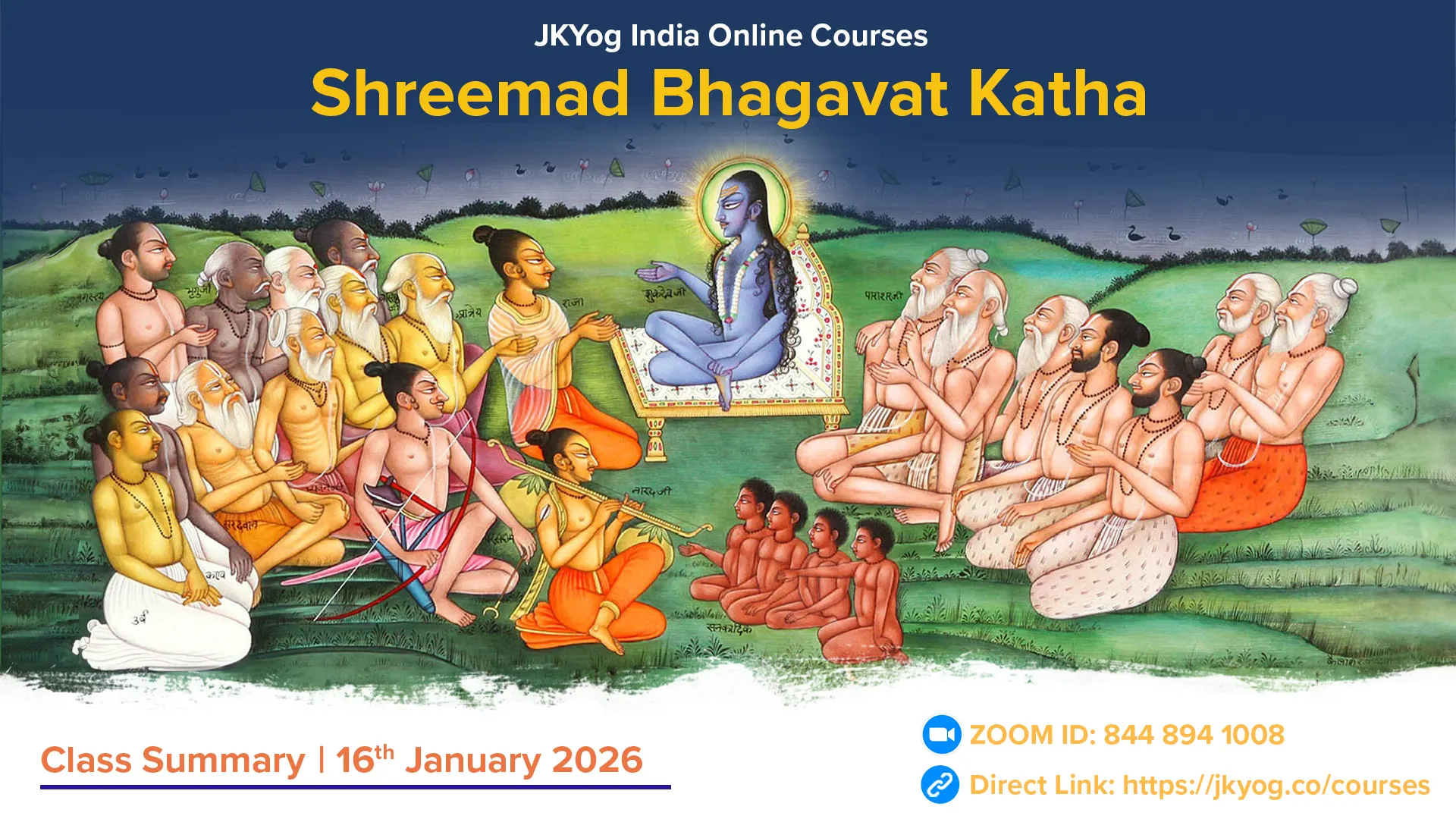Shreemad Bhagavat Mahapuran- Canto: 4, Chapters: 1 to 4
Swayambhuva Manu and Shatarupa had two sons, Priyavrata and Uttanapada, and three daughters, Aakuti, Devahuti, and Prasuti. Aakuti's marriage to Prajapati Ruchi was conducted according to the 'Putrikadharma'. In this custom, when a father marries off his daughter with the condition that the first son born to her will be adopted and considered the father’s son, it is called marriage under 'Putrikadharma'. Prajapati Ruchi, being deeply devoted to Bhagwan, was endowed with immense Brahmatej (spiritual brilliance). From Aakuti's womb, a pair of twins was born— a male and a female. The male was none other than Bhagwan Vishnu in the form of Yajna (sacrifice), and the female was 'Dakshina', an aspect of Lakshmi. Manu took Aakuti's son to his home, while Prajapati Ruchi kept Dakshina. Later, Dakshina was married to Bhagwan Yajna. Bhagwan Yajna and Dakshina had twelve sons: Tosha, Pratosha, Santosh, Bhadra, Shanti, Idaspati, Idhma, Kavi, Vibhu, Swahna, Sudeva, and Rochan. They became the 'Tushit' gods during the Swayambhuva Manvantara. In that Manvantara, the seven sages (Saptarishi) were headed by Marichi, and Bhagwan Yajna was the Indra (ruler of the gods).
Manu's second daughter, Devahuti, was married to Kardamaji, from whom Bhagwan Kapil was born, along with nine daughters who were married to the nine Brahmarshis.
- Rishi Marichi’s wife, Kala, gave birth to two sons, Kashyap and Purnima. Purnima had two sons, Viraj and Vishvaga, and a daughter named Devakulya. In her next birth, Devakulya manifests as the divine river Ganga.
- Rishi Atri's wife, Anusuya, bore three illustrious sons: Dattatreya, Durvasa, and Chandra. They were born from the aspects of Bhagwan Vishnu, Bhagwan Shankar, and Brahma, respectively. When Brahmaji ordered Maharishi Atri to assist in creation, Atri and his wife Anusuya went to Rishya mountain and performed penance for 100 years, standing on one leg. With the desire to have sons like the Supreme Bhagwan, they meditated intensely. Pleased by their devotion, Brahma, Vishnu, and Mahadev blessed them with three famous sons: Chandra from Brahma’s aspect, Dattatreya from Vishnu’s, and Durvasa Rishi from Mahadev’s.
- Rishi Angira’s wife, Shraddha, gave birth to four daughters: Sinivali, Kuhu, Raka, and Anumati. Additionally, she had two sons—Bhagwan Utathya and the pious Brahmanishtha Brihaspati.
- Pulastya Rishi’s wife, Havirbhu, gave birth to two sons: Maharishi Agastya and the great ascetic Vishrava. In his next birth, Agastya became Jatharagni (the digestive fire). Vishrava had Kubera, the king of the Yakshas, from his wife Idvida, and from his second wife, Keshini, he had Ravan, Kumbhakarna, and Vibhishan.
- Maharishi Pulaha’s wife, Gati, bore three sons: Karmashreshtha, Varian, and Sahishnu.
- Rishi Kratu’s wife, Kriya, gave birth to 60,000 sages.
- Rishi Vashishtha’s wife, Urja (also known as Arundhati), gave birth to seven pure-hearted Brahmarishis: Chitraketu, Surochi, Viraja, Mitra, Ulbhan, Vasubhridyan, and Ghuman. Additionally, from another wife, he had sons like Shakti and many others.
- Atharva Muni’s wife, Chitti, bore a son named Dadhichi, also known as Ashwashira.
- Bhrigu Rishi’s wife, Khyati, gave birth to two sons, Dhata and Vidhata, and a daughter, Shri, who was devoted to Bhagwan.
Rishi Meru married his daughters, Ayati and Niyati, to Dhata and Vidhata, respectively. From them, two sons were born: Mrikanda and Prana. Mrikanda’s son was the great sage Markandeya, and Prana’s son was Muni Vedashira. Bhrigu Rishi also had a son named Kavi, and Bhagwan Ushana (Shukracharya) was his descendant. All these great sages expanded creation by producing offspring.
Manu married his third daughter, Prasuti, to Daksha Prajapati, the son of Brahmaji. Daksha fathered sixteen daughters. Out of these, thirteen were given to Dharma, one to Agni, one to the Pitris, and one to Bhagwan Shankar. The wives of Dharma were Shraddha, Maitri, Daya, Shanti, Tushti, Pushti, Kriya, Unnati, Buddhi, Medha, Titiksha, Hri, and Murti.
Each of these wives gave birth to children with distinct qualities:
- Shraddha gave birth to Shubha,
- Maitri to Prasad,
- Daya to Abhaya,
- Shanti to Sukha,
- Tushti to Moda,
- Pushti to Ahankara,
- Kriya to Yog,
- Unnati to Darp (pride),
- Buddhi to Artha (wealth),
- Medha to Smriti (memory),
- Titiksha to Kshem (well-being),
- Hri (modesty) to Prashraya (humility).
Murti, who was a treasure trove of virtues, gave birth to the great sages Nar-Narayan. Agni’s wife, Swaha, gave birth to three sons—Pavak, Pavamana, and Shuchi—who were embodiments of Agni. These three consume the offerings in sacrifices (havans). From them arose forty-five types of Agnis. These, along with their three fathers and one grandfather, make up the forty-nine fires (Agnis). The Vedic Brahmins use these names during sacrificial rituals (Agneya Ishtis).
The Pitris (forefathers) are divided into four categories: Agnishvattas, Barhishads, Somapas, and Ajyapas. Some of them are associated with fire (Sagnik), and others without (Niragnik). The wife of these Pitris was Daksha’s daughter, Swadha. They had two daughters, Dharini and Vayuna, both highly skilled in knowledge and wisdom and renowned for imparting Brahmajnana (knowledge of the Supreme).
Daksh Prajapati's Enmity Towards Mahadev and Sati’s Sacrifice
Bhagwan Mahadev's wife, Sati, does not bear any child despite being endowed with noble virtues. Once, during a grand sacrificial ceremony (yajna) attended by the great sages, devas, munis, and fire gods (Agni) with their followers, Prajapati Daksha enters the assembly hall. His brilliance shines like the sun, dispelling the darkness of the vast hall. All present, except for Brahmaji and Mahadev, rise from their seats to show respect to Daksha. After saluting Brahmaji and taking his seat, Daksha notices that Mahadev has not risen or shown him any form of respect. This enrages Daksha, and with sharp eyes, he begins to speak harshly in the assembly, accusing Mahadev of not following proper etiquette and disrespecting his authority and honour.
Daksha insults Mahadev severely, calling Him arrogant, impure, and someone who roams in cremation grounds with ghosts and spirits. He ridicules Mahadev's dishevelled hair, ash-covered body, a garland of skulls, and bone ornaments, labelling Him as inauspicious and unworthy. Daksha further expresses his regret at having married his innocent daughter, Sati, to someone like Mahadev, whom he derisively refers to as the leader of ghouls, who lacks proper behaviour and has a wicked nature.
Despite the severe insults hurled at Him, Mahadev remains calm and unmoved. Daksha's anger escalates, and he takes water in his hand, ready to curse Mahadev. Daksha declares, "This Mahadev is the lowest among the devas. From now on, He shall not receive any share of the offerings in yajnas along with Indra, Upendra, and other devas." Even though the respected members of the assembly try to dissuade him, Daksha ignores their pleas and curses Mahadev.
When Nandishwar, one of the foremost followers of Shree Shankarji, learns of Daksha's curse, he becomes furious. In his rage, Nandishwar curses Daksha and the Brahmins who supported Daksha's offensive words. Nandishwar declares, "Daksha, who is proud of his perishable body and harbours enmity against Bhagwan Shankar, who bears no malice towards anyone, is foolish and will remain ignorant of true knowledge. His intellect is tied to his body and material possessions, leading him to forget his true self. He is no better than an animal, and as a result, he shall become extremely lustful and soon have the face of a goat. Those who follow this wicked Daksha and disrespect Bhagwan Shankar shall continue to be trapped in the cycle of birth and death. These Brahmins, who have abandoned the distinction between what is appropriate and inappropriate to consume, will resort to using their knowledge, penance, and vows merely to fill their bellies. They will wander the world, begging for alms, considering wealth, bodily pleasures, and indulgence of the senses as the ultimate happiness."
Upon hearing Nandishwar's curse against the Brahmin clan, Bhṛigu Rishi responded with a counter-curse. He declared, "Those who are devotees of Shiva and their followers shall act against the true scriptures and become hypocritical. They, lacking cleanliness and purity, having dull minds, and adorning matted hair, ashes, and bones, shall be the ones initiated into the Shaiva sect, where intoxicating substances like alcohol and liquor are treated with reverence as if they were gods."
After Bhṛigu Rishi pronounced this curse, Bhagwan Shankar felt somewhat saddened and left the place with His followers. The other devas, ṛishis, and others also finished the yajña, which was to last a thousand years and performed the concluding bath at the confluence of the Ganga and Yamuna rivers before returning to their respective abodes. Thus, considerable time passed with a lingering enmity between the father-in-law, Daksha, and his son-in-law, Bhagwan Shiva.
Brahmaji appointed Daksha as the chief of all the Prajapatis (progenitors) during this period. This further inflated his ego. He began performing grand sacrifices, starting with the Vajapeya yajna and then the Brihaspati Sava yajna, deliberately excluding Bhagwan Shankar and other Brahma-nishtha (steadfast in Brahma) individuals from receiving their due share in the rituals.
For this occasion, all the Brahma rishis, Devarishis, ancestors (pitris), and gods arrived with their wives and partook in the auspicious ceremonies, receiving great hospitality from Daksha. While travelling through the skies, the devas conversed among themselves about the yajna, and Daksha’s daughter, Sati, overheard them speaking of the grand sacrifice happening at her father’s house. This piqued her curiosity, and she approached Bhagwan Shiva, saying, "My Lord, I’ve heard that my father, Daksha Prajapati, is performing a great yajna, and the devas are also attending. My sisters will surely come with their husbands, and I, too, wish to visit and receive gifts from my parents. I long to meet my mother and sisters. Please, fulfil my wish. You are compassionate and have given me half of your body, so I ask you to kindly grant me this request."
Bhagwan Shiva listened to Sati's plea and replied, "Beloved, it is only appropriate to visit one’s relatives without an invitation if there is no pride or anger in their hearts. Where there is arrogance, rage, and hatred, only pain will result from going. The wounds inflicted by enemies' arrows do not hurt as much as the pain caused by the harsh words of one’s own kin. Daksha Prajapati harbours enmity toward me, and you will not be honoured there. You are dear to me, and he has already insulted me. Going there will not be good for you, as being humiliated by your own people is deeply distressing."
With this, Bhagwan Shiva fell silent as He realised that whether He allowed Sati to go or forbade her, the outcome would likely lead to her sacrificing her life.
Sati, torn between the desire to visit her family and the fear of upsetting Bhagwan Shiva, found herself in a state of dilemma. Sometimes, she would decide to go see her relatives, and at other times, the worry that Shiva might be displeased would hold her back. This constant indecision made her restless and unsettled. The obstruction in fulfilling her desire to meet her family left her deeply disheartened. Overcome with affection for her loved ones, her heart filled with emotion, and she began to weep in distress. Her body trembled, and in her sorrow and anger, she gazed at Bhagwan Shiva as if she would burn Him with her fiery glance. Her mind, agitated by grief and rage, became unstable, and due to her feminine nature, her reasoning faltered. Despite being loved and cherished by Shiva, who had given her half of His being, she left, sighing deeply and making her way to her parents' house.
Seeing Sati leaving so hastily on her own, Bhagwan Shiva's vehicle, Nandi, rushed ahead of her, followed by a retinue of attendants and yakshas who quickly pursued her. They placed Sati on the bull, and with all the royal signs, such as a white umbrella, fans, garlands, and musical instruments, they proceeded with the grand procession. Sati, along with her attendants, reached Daksha Prajapati's sacrificial site. There, the brahmins were chanting the Vedas, devas and sages were seated, and the offerings for the yajna were scattered around.
At her father's house, Sati faced humiliation as her father disrespected her, and out of fear of him, others did not welcome her either. Only her mother and sisters embraced her lovingly. However, the main gathering at the yajna mandap shunned Sati, and she saw that no portion of the offerings had been reserved for Bhagwan Shiva. Seeing this, Sati was consumed with intense anger, as though she could burn the entire universe with her fury. Daksha, prideful due to his adherence to ritualistic practices, was harbouring hatred towards Shiva. When the bhoots (followers of Shiva) who had accompanied Sati became enraged and prepared to kill Daksha, Sati restrained them with her divine power. She then publicly rebuked her father in a voice filled with anger, saying:
"Father! There is no one greater than Bhagwan Shiva. He is the beloved soul of all living beings, and He harbours no ill will toward anyone. Who, apart from you, would dare to oppose Him? People like you see faults in even the virtues of others, but saints do not behave in such a manner. The truly great ones recognise even the smallest qualities in others as significant. You have slandered a noble soul. Wicked people who consider the body to be the soul, out of jealousy, malign the great ones. Slandering the God-realised personalities is a heinous act. You bear enmity toward Bhagwan Shiva, who is known for His sacred deeds and auspiciousness. Simply uttering His name, 'Shiva,' once is enough to destroy all sins. You, who malign the great, are the embodiment of inauspiciousness. Those who protect their dharma and revere their lord should either close their ears or cut off the tongue that slanders their master. This is the right way to protect one's dharma."
Sati continued, "You have insulted Bhagwan Neelkanth (Shiva), and therefore, I can no longer bear to live in this body. If one accidentally consumes something contaminated, the only way to purify oneself is to vomit it out. Just as there is a difference in the fates of devas and humans, there is also a vast difference in the understanding of the wise and the ignorant. A person should remain true to their dharma and not criticise the path of others. Both paths of action (yajna and sacrifices) and renunciation (self-control and spiritual practices) are valid, but they cannot be pursued together. Bhagwan Shiva is the Supreme Brahman, the Supreme Soul; He has no need to perform any action. Father, you have committed a grave offence against Bhagwan Shiva, and I feel ashamed to be related to someone as wicked as you. The birth of someone who commits such an offence against the great ones is a disgrace. When Bhagwan Shiva refers to me as 'Dakshayani,' I will feel great shame and sorrow. Therefore, I will abandon this body, which is nothing more than a corpse born from your flesh."
Devi Sati silently sat down in the yajna mandap, facing north. She performed the ritual of sipping water (achaman) and wrapped herself in a yellow cloth, preparing to leave her body through the path of yoga. She united her prana and apana (vital energies) and concentrated them at the navel chakra. Gradually, she directed them toward her heart and then expanded the presence of air and fire through her entire body. Meditating deeply on the feet of Bhagwan Shiva, she let go of all other thoughts, and her body was consumed by the fire of yoga.
When the devas (gods) witnessed Sati's sacrifice and her departure from her mortal body, they began to wail in sorrow. Cries echoed all around, saying, "Alas! Due to Daksha's mistreatment, Sati has abandoned her life in fury. Daksha is intolerant and an enemy of Brahmins! His daughter, Sati, has given up her life, and he didn't even try to stop her!"
Seeing Sati's sacrifice, Bhagwan Shiva's attendants rose, armed with weapons, ready to kill Daksha in anger. However, seeing the ferocity of their attack, Bhrigu Rishi summoned thousands of fiery devas named 'Ribhus' from the sacrificial fire. These radiant beings launched an assault using burning logs, forcing Shiva's attendants—the Guhyakas and Pramathas—to flee in all directions.
Summary: JKYog India Online Class- Shreemad Bhagavat Katha [Hindi]- 18.10.2024

